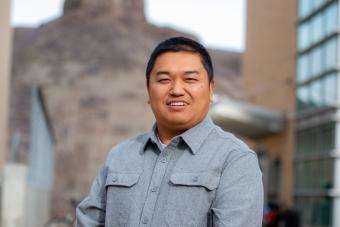Dong Chen wins NSF CAREER Award for project on cybersecurity, smart home device data

Dong Chen, assistant professor of computer science at Colorado School of Mines, has received a National Science Foundation CAREER Award for research that aims to give users of smart home devices more control over their data privacy.
Chen will receive $586,000 over five years for his work to create a family of algorithms, mechanisms and prototypes that will strengthen Internet of Things (IoT) security and privacy for smart homes.
As part of his project, Chen will also develop IoT cybersecurity workshops for middle and high school teachers at public schools in Colorado, with an emphasis on districts with significant populations of students from backgrounds underrepresented in STEM. Hands-on course modules will be developed on IoT systems, cybersecurity and artificial intelligence that will be used to train students from K-12, undergraduate and graduate levels. Outreach events related to this work will be conducted for local elementary, middle and high schools to guide the next generation of IoT, cybersecurity and AI researchers.
“I hope to have a long-term impact on IoT device privacy,” Chen said. “If successful, this project will open the doors for me to expand my long-term research and education agenda.”
Here, Chen explains the different aspects of his CAREER project, from putting the power of privacy protection into the hands of smart home device users to increasing diversity in the cybersecurity field.
Q: What is your latest research focused on?
A: At Mines, I lead the data-driven Cyber-Physical Systems Laboratory, which focuses on designing data-driven computer systems with an emphasis on improving cybersecurity and user privacy of cyber-physical systems (CPS) and the Internet of Things. This project is real-life problem driven. With smart home devices like Alexa or Google Home, they’re monitoring all the time and people are not in control of the data. My research enables the user to regain that control, set their data privacy how they want and get their privacy back.
Q: What do you find most exciting about your research?
A: This project forms a vital foundation for my long-term career goal of building smart home user privacy-friendly IoT data management frameworks that enable people to manage their IoT devices at different phases in the whole data cycle. There are several parts of this project that can have positive impact. First, designing new privacy-aware IoT data collection and sharing systems that enable people to have greater control on when data is collected and how it is shared with others. Second, building new privacy-aware smart home systems that help people achieve the trade-off between their privacy preferences and smart home automation. And lastly, guiding the next generation of IoT cybersecurity and privacy researchers at different levels, including K-12, ungraduated and graduate, at different institutions.
Q: What is the potential impact of this work?
A: My research will provide fundamental insights into designing privacy preserving systems in smart homes. We are living in an era of social media where privacy issues are often overlooked, while technical advances from IoT devices have outpaced the debate on the privacy implications of these technologies.
I also hope to impact cybersecurity education at different levels as well as strengthening diversity in STEM and computing. I chair the Institute of Electrical and Electronics Engineers BigDataCPS workshop series and demo the latest results to the public research community. I also have public outreach initiatives with the Computer Science Teachers Association’s Colorado chapter. As always, I continue to open-source the outcomes of this project on my lab’s GitHub page. And on a personal level, I am committed to strengthening diversity in computing by recruiting more women and underrepresented students in my lab.
Q: How does this research agenda inform your teaching?
A: This project will support my teaching in several ways. At the undergraduate and graduate levels, my project coincides with Mines’ and University of Colorado Denver’s Data Science and Cybersecurity program initiatives. My project’s cybersecurity modules and activities will be integrated into Mines’ core cybersecurity classes. I also plan to integrate outcomes into CU Denver’s Introduction to Emerging System Security class. In addition, my project’s AI modules and activities will be integrated into core courses in Mines’ Data Science program.
I will also be restructuring a course I teach, CSCI 442: Operating Systems, to integrate new insights created by this project, giving students more exposure to the fundamental IoT TinyOS and TinyML in modern smart home automation.
For the middle and high school levels, the developed modules will be integrated into key cybersecurity elements of CS@Mines’ Broadening Participation in Computing Plan, which includes DECtech, an outreach program designed especially for girls to engage with STEM. The DECTech program helps increase the number of women in computing, with approximately 400 K-12 girls participating each semester. The modules will also be integrated into Mines’ CS@Mines on Tour program, in which Mines students and faculty travel to local schools to lead computer science-oriented events and activities.




